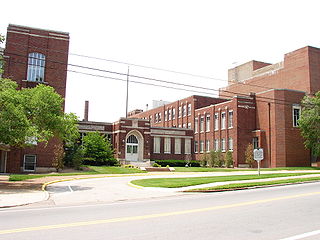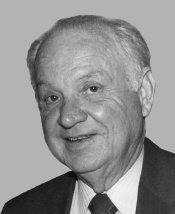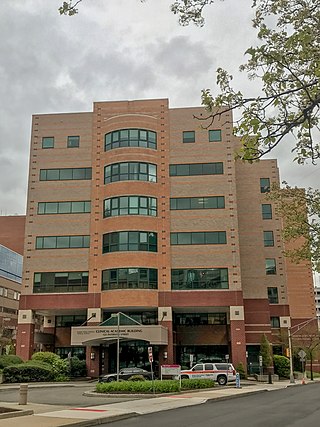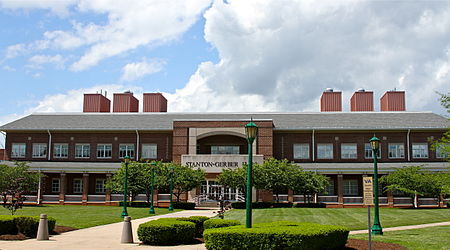
Johnson City is a city in Washington, Carter, and Sullivan counties in the U.S. state of Tennessee, mostly in Washington County. As of the 2020 United States census, the population was 71,046, making it the eighth-most populous city in Tennessee. Johnson City is the principal city of the Johnson City Metropolitan Statistical Area, which consists of Carter, Unicoi, and Washington counties and had a population of 207,285 as of 2020. The MSA is also a component of the Tri-Cities region. This CSA is the fifth-largest in Tennessee, with a population of 514,899 as of 2020.

William Harrison Frist is an American physician, businessman, conservationist and policymaker who served as a United States Senator from Tennessee from 1995 to 2007. A member of the Republican Party, he also served as Senate Majority Leader from 2003 to 2007. Born in Nashville, Tennessee, Frist studied government and health care policy at Princeton University and earned a Doctor of Medicine degree from Harvard Medical School. He trained as a cardiothoracic transplant surgeon at Massachusetts General Hospital and Stanford University School of Medicine, and later founded the Vanderbilt Transplant Center. In 1994, he defeated incumbent Democratic Senator Jim Sasser.

Meharry Medical College is a private historically black medical school affiliated with the United Methodist Church and located in Nashville, Tennessee. Founded in 1876 as the Medical Department of Central Tennessee College, it was the first medical school for African Americans in the South. While the majority of African Americans lived in the South, they were excluded from many public and private racially segregated institutions of higher education, particularly after the end of Reconstruction.

Ned Ray McWherter was an American businessman and politician who served as the 46th Governor of Tennessee, from 1987 to 1995. Prior to that, he served as Speaker of the Tennessee House of Representatives from 1973 to 1987, the longest tenure as Speaker up to that time. He was a member of the Democratic Party.

East Tennessee State University (ETSU) is a public research university in Johnson City, Tennessee. It was historically part of the State University and Community College System of Tennessee under the Tennessee Board of Regents, but since 2016, the university has been transitioning to governance by its own board of trustees. As of May 2017, it is the fourth largest university in the state and has off-campus centers in nearby Kingsport, Elizabethton, and Sevierville.

New York Medical College is a private medical school in Valhalla, New York. Founded in 1860, it is a member of the Touro University System.

Bryant Winfield Culberson Dunn was an American businessman and politician who served as the 43rd governor of Tennessee from 1971 to 1975. He was the state's first Republican governor in fifty years. Dunn was an unsuccessful candidate for a second term in 1986, losing to Democrat Ned McWherter. He remained active in the Republican Party and the medical field from the end of his term as governor until his death.

James Henry Quillen was an American politician who served as a Republican member of the United States House of Representatives from Tennessee from 1963 to 1997. Quillen represented the 1st congressional district, which covers the northeast corner of the state, including the Tri-Cities region.

The University of Tennessee Health Science Center (UTHSC) is a public medical school in Memphis, Tennessee. It includes the Colleges of Health Professions, Dentistry, Graduate Health Sciences, Medicine, Nursing, and Pharmacy. Since 1911, the University of Tennessee Health Science Center has educated nearly 57,000 health care professionals. As of 2010, U.S. News & World Report ranked the College of Pharmacy 17th among American pharmacy schools.

Rutgers Robert Wood Johnson Medical School is a medical school of Rutgers University. It is one of the two graduate medical schools of Rutgers Biomedical and Health Sciences, together with New Jersey Medical School, and is closely aligned with Robert Wood Johnson University Hospital, the medical school's principal affiliate.
The University of Illinois College of Medicine offers a four-year program leading to the MD degree at four different sites in Illinois: Chicago, Peoria, Rockford, and formerly Urbana–Champaign. The Urbana–Champaign site stopped accepting new students after Fall 2016 to make room for the newly established Carle Illinois College of Medicine.
The Tennessee Plan is a system used to appoint and elect appellate court judges in Tennessee. It is largely patterned after the Missouri Plan, and an earlier version in Tennessee was called the Modified Missouri Plan. At the end of every judge's eight-year term following a judicial appointment to the highest courts, retention elections are held, which have the option of whether each judge shall be retained through a yes-no option. This system applies to the Tennessee Supreme Court, the Tennessee Court of Appeals, and the Tennessee Court of Criminal Appeals.

The Tree of Hippocrates is the plane tree under which, according to legend, Hippocrates of Kos taught his pupils the art of medicine. Paul of Tarsus purportedly taught here as well. The Platanus in Kos is an oriental plane, with a crown diameter of about 12 m (39 ft), said to be the largest for a plane tree in Europe.

David Phillip Roe is an American politician and physician who was the U.S. representative for Tennessee's 1st congressional district, serving from 2009 to 2021. He is a member of the Republican Party. From 2017 to 2019, Roe was chairman of the House Committee on Veterans Affairs.

The University of Tennessee Medical Center (UTMC) is an academic medical center located in Knoxville, Tennessee and serves as a referral center for East Tennessee and regions in Kentucky and North Carolina. The University of Tennessee Graduate School of Medicine (UTGSM) oversees residency and medical student education at UTMC. In addition to being a Level I Trauma Center, UTMC is recognized as a center for primary stroke, biomedical imaging, adult & children transplantation, pediatric dialysis, and kidney failure. In 2010, UTMC opened East Tennessee's first dedicated heart hospital.
The East Tennessee State Buccaneers football program is the intercollegiate American football team for East Tennessee State University (ETSU) located in Johnson City, Tennessee. The team was dormant from the end of the 2003 season until being reinstated for the 2015 season. They played all of their 2015 home games and all but one of their 2016 home games at Kermit Tipton Stadium before the opening of the new William B. Greene Jr. Stadium for the 2017 season. The remaining 2016 home game, against Western Carolina on September 17, was played at nearby Bristol Motor Speedway, which was already set up for football due to a game the prior week between the University of Tennessee and Virginia Tech. Before ETSU dropped football, it competed in NCAA Division I as a Southern Conference (SoCon) football program. The revived program played as an independent in 2015 before returning to the SoCon in 2016.
The Howard University College of Medicine (HUCM) is an academic division of Howard University that grants the Doctor of Medicine (M.D.), Ph.D., M.S., and the M.PH. HUCM is located at the Howard University Health Sciences Center in Washington, D.C., and it was founded in 1868 in response to the growing population of the city.
The University of Tennessee College of Medicine is one of six graduate schools of the University of Tennessee Health Science Center (UTHSC) in downtown Memphis. The oldest public medical school in Tennessee, the UT College of Medicine is a LCME-accredited member of the Association of American Medical Colleges (AAMC) and awards graduates of the four-year program Doctor of Medicine (MD) degrees. The college's primary focus is to provide practicing health professionals for the state of Tennessee.
Johnson City Medical Center is a hospital in Johnson City, Tennessee. It is a Level I Trauma Center and one of three major tertiary referral hubs of regional provider Ballad Health. It has 445 beds, plus 86 in the attached Niswonger Children's Hospital. It is also a teaching hospital for numerous institutions, including the adjacent East Tennessee State University James H. Quillen College of Medicine.
Lisa Piercey is an American physician and served as the 15th Commissioner of the Tennessee Department of Health, appointed by Governor Bill Lee in 2019.


















